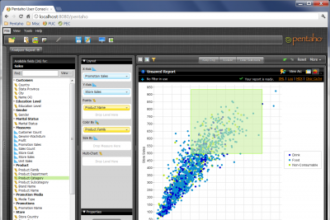 For any company worth its salt, optimal business intelligence relies on having a full understanding of a number of elements. One of the most important of these is that a business must be in touch with its customer base.
For any company worth its salt, optimal business intelligence relies on having a full understanding of a number of elements. One of the most important of these is that a business must be in touch with its customer base.
 For any company worth its salt, optimal business intelligence relies on having a full understanding of a number of elements. One of the most important of these is that a business must be in touch with its customer base. It is vital for these firms to know exactly what consumers or clients think of new and established products or services, recent initiatives and customer service offerings.
For any company worth its salt, optimal business intelligence relies on having a full understanding of a number of elements. One of the most important of these is that a business must be in touch with its customer base. It is vital for these firms to know exactly what consumers or clients think of new and established products or services, recent initiatives and customer service offerings.
Sentiment analysis is one of the ways by which this necessary task is accomplished. This involves tracking the opinions and desires of customers through the collection of big data, and then quantifying it so that it can be put to actionable use. According to GigaOM, Scientists at Stanford University recently identified a way in which sentiment analysis can catalog data gleaned from social media channels in ways never before possible. Advances such as these, coupled with the use of the best possible BI software, will be excellent tools for companies to consider adopting.
Taking a look at the Stanford Model
Led by Andrew Ng – the co-founder of e-learning platform Coursera and a recognized machine learning expert – and Ph.D. student Richard Socher, the team of Stanford researchers has devised a model that examines entire sentences within content. This is a step up from some sentiment analysis platforms. Many of them can only focus on words within Facebook posts, tweets, LinkedIn statements, Yelp reviews or other forums where customers and clients may express their opinions on a brand.
As a test of its methodology, the Stanford team culled 11,000 sentences from online movie reviews and used the resulting data to create quantitative measurements of large swaths of public opinion. The current version of the analysis model has 85 percent accuracy, in terms of picking out the sentiment of a sentence. Socher hopes that it can reach 95 percent with some fine-tuning in the future.
A social focus for analytics
Those who have been going on at great length about the value and prominence of social media for some time were never crying wolf, although many tradition-minded executives may have wanted to think they were. These platforms are where customers and clients often go to extol the virtues or air their grievances about businesses. Analytics efforts have to be focused on these channels of consumer opinion more than others. A separate GigaOM report pointed out that traditional polling and focus group analysis has largely been subsumed by social, so now is the perfect time to look into the sort of software that can properly quantify this data in an actionable way.







